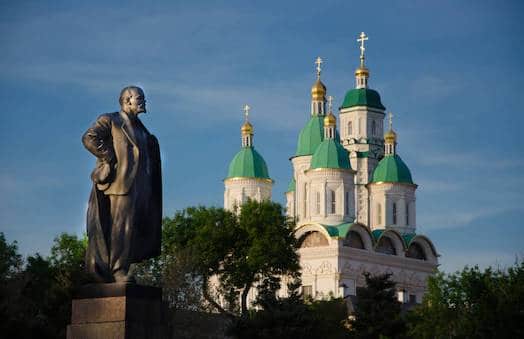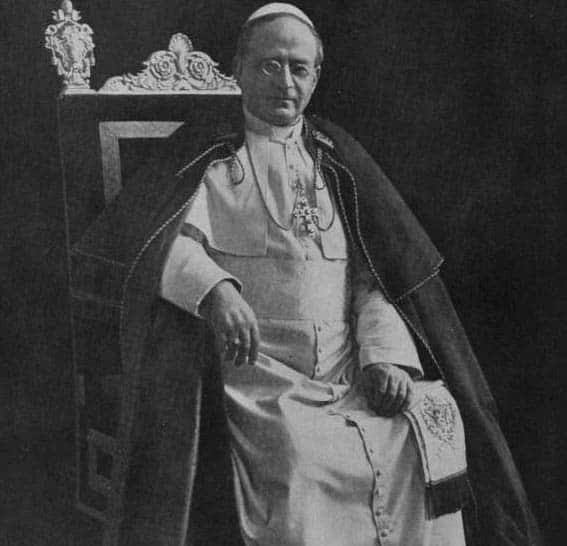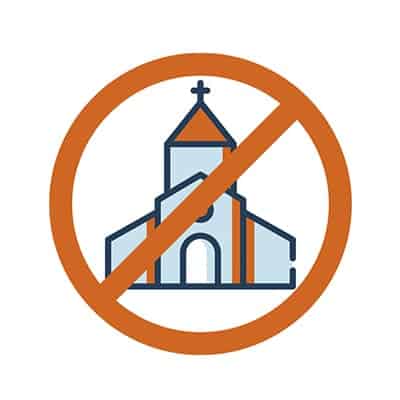The Catholic Church and Democratic Socialism
Irreconcilable with Christianity
Classic Socialism
Often Has Similar Goals as Christian Teaching
We must distinguish between classic socialism (typically called ‘Communism’), and other, newer, forms of socialism (sometimes called ‘Democratic Socialism’).
Let us define and address each of these, in turn.
Classic socialism is the economic system that can be seen as the transition between capitalism and communism. Its aims are for the state to own and regulate the means of production. People then share equally in the outputs of the system. Its popularity resulted from the writings of Karl Marx.
- Advocates government ownership and administration of the means of production and distribution of goods, and
- Collapsed in 1989 with the fall of the USSR and Eastern European ‘socialist’ regimes.
- Was greatly modified by Deng Xiaoping in China, beginning with his far-reaching market-economy reforms in the early 1980’s.
- Still exists in places like Cuba and North Korea.
This socialism has been condemned by Catholic social teaching starting with Pope Leo XIII in 1891, through Pope Pius XI in 1931 to Pope St. John Paul II in 1991 as it violates private property rights, subsidiarity and anthropology.
Let Us Be Clear!
Catholic social teaching has never said anything positive about this socialism.
Classic Socialism Clashes with Certain Human Rights

Violates Private Property
Pope Leo XIII, in Rerum Novarum, found that socialism violates rights of private property and hurts the working person.
Socialism, he said, is “emphatically unjust” for it “would rob the lawful possessor, distort the functions of the State, and create utter confusion in the community.” (Rerum Novarum, 4)
Socialism “must be utterly rejected, since it only injures those whom it would seem meant to benefit, is directly contrary to the natural rights of mankind, and would introduce confusion and disorder into the commonweal.” (Rerum Novarum, 24)
Read More
One hundred year later Pope St. John Paul II endorsed this masterful insight: “This right, [to private property] which is fundamental for the autonomy and development of the person, has always been defended by the Church up to our own day”. (Pope St. John Paul II, 30)
And, “By defining the nature of the socialism of his day as the suppression of private property, Leo XIII arrived at the crux of the problem.” (Pope St. John Paul II, 12)
“The first and most fundamental principle, therefore, if one would undertake to alleviate the condition of the masses, must be the inviolability of private property.” (Pope St. John Paul II, 15)

Violates Subsidiarity
Pope Pius XI, in Quadragesimo Anno, found socialism violates the key Catholic social teaching principle of Subsidiarity:
“That most weighty principle, which cannot be set aside or changed, remains fixed and unshaken in social philosophy: Just as it is gravely wrong to take from individuals what they can accomplish by their own initiative and industry and give it to the community, so also it is an injustice and at the same time a grave evil and disturbance of right order to assign to a greater and higher association what lesser and subordinate organizations can do.” (Quadragesimo Anno, 79)
Read More
“The State…must not extend their ownership beyond what is clearly required by considerations of the common good properly understood, and even then there must be safeguards. Otherwise private ownership could be reduced beyond measure, or, even worse, completely destroyed.” (Pope St. John XXIII, 117)

Violates Anthropology
Finally, Pope St. John Paul II, in Centesimus Annus, demonstrates socialism’s failure to comprehend anthropology – the human person. “It is not possible to understand man on the basis of economics alone”. (Centesimus Annus, 24)
Under socialism, freedom “is replaced by a burdensome system of bureaucratic control which dries up the wellsprings of initiative and creativity”. (Centesimus Annus, 25)
Thereby, socialism ultimately fails due to “an understanding of human freedom which detaches it from obedience to the truth, and consequently from the duty to respect the rights of others.” (Centesimus Annus, 17)
Read More
He recognized that: “Man is understood in a more complete way when he is situated within the sphere of culture” and, “[a]t the heart of every culture lies the attitude man takes to the greatest mystery: the mystery of God…When this question is eliminated, the culture and moral life of nations are corrupted.” (Centesimus Annus, 24)
So, in addition to socialism’s failure due to: 1) violations of the rights of workers (private initiative, ownership of property, and economic freedom); 2) the inefficiency of its economic system, and; 3) as a consequence of violating human rights — socialism ultimately fails because of the “spiritual void brought about by atheism”. (Centesimus Annus, 24)
Democratic Socialism
Pinning down how adherents of Democratic Socialism consistently self-define proved impossible. However, an analysis of numerous “Democratic Socialism” and “Socialist” web-sites in the US and Europe made clear their harmony in advocating for one or both of these positions.
Advocates:
Government provides a range of basic services, such as health care and higher education, for free or at a significant discount, and/or;
Government control of vast sectors of the economy – in order to ameliorate perceived “ills” (climate change, income inequality, etc.).
How closely the current movement aligns with the “even moderate socialism” condemned by the Catholic Church for its singular focus on man’s economic “nature” and rejection of God as our ultimate goal is, of course, open to discussion and awaits a fuller explication of beliefs from adherents.
The Church Affirms Many Ends of Democratic Socialism
Catholic social teaching and democratic socialism share common goals. Democratic socialism promotes certain teachings of the Catholic Church, in that it values human dignity and solidarity. But, while the Catholic Church and democratic socialism share parallels in terms of end goals that is where the similarities end. Pope Pius XI explained…
Indeed, more moderate “socialism inclines toward and in a certain measure approaches the truths which Christian tradition has always held sacred; for it cannot be denied that its demands at times come very near those that Christian reformers of society justly insist upon.”
The issues addressed in many cases demand a response arising from a simple consideration of the Catholic social teaching principles of human dignity and solidarity. In fact, “It can come even to the point that imperceptibly these ideas of the more moderate socialism will no longer differ from the desires and demands of those who are striving to remold human society on the basis of Christian principles.”!

Not the Means!
Socialism, even moderate forms like democratic socialism, essentially reduces mankind into economic elements. However, the Catholic Church rejects that human beings can be so understood. Socialism and democratic socialism, therefore, lose an important insight into the basic idea of a human anthropology. The Catholic Church places man in the fullness of his social and shared humanity. By seeing man only in his material element socialism and democratic socialism fail in appreciating man’s true grandeur.
The “means” of even “moderate socialism” “cannot be reconciled with the teachings of the Catholic Church because its concept of society itself is utterly foreign to Christian truth”. (Pope Pius XI, 117)
Even moderate socialism “is based…on a theory of human society… irreconcilable with true Christianity.” (Pope Pius XI, 120)
“We have found all their forms, even the most modified, to wander far from the precepts of the Gospel.” (Pope Pius XI, 128)
Read More
“By intervening directly and depriving society of its responsibility, the Social Assistance State leads to a loss of human energies and an inordinate increase in public agencies which are dominated more by bureaucratic ways of thinking than by concern for serving their clients, and which are accompanied by an enormous increase in spending. In fact, it would appear that needs are best understood and satisfied by people who are closest to them and who act as neighbors to those in need”. (Pope St. John Paul II, 48)
Democratic Socialism May Violate Anthropology
Pope Pius XI “made it clear that no Catholic could subscribe even to moderate Socialism”. (Pope St. John XXIII, 34)
“According to Christian teaching, man, endowed with a social nature, is placed on this earth so that by leading a life in society and under an authority ordained of God he may fully cultivate and develop all his faculties unto the praise and glory of his Creator;” (Pope Pius XI, 118)
“Socialism…wholly ignoring and indifferent to this sublime end of both man and society, affirms that human association has been instituted for the sake of material advantage alone.” (Pope Pius XI, 118)
As Might Unbridled Capitalism
“Insofar as it [Unbridled Capitalism] denies an autonomous existence and value to morality, law, culture and religion, it agrees with Marxism, in the sense that it totally reduces man to the sphere of economics and the satisfaction of material needs.” (Pope St. John Paul II, 19)
Read More
Based on anthropology, is the Church really saying that there is little difference between “even moderate forms of socialism” and unbridled capitalism? Yes!
A real danger lies in “ideological rejection…oblivious to the Creator and at risk of becoming equally oblivious to human values…A humanism which excludes God is an inhuman humanism. (Pope Benedict XVI, 78)
“The crisis will not be completely over until situations and living conditions are examined in terms of the human person and human dignity…Our duty is to continue to insist…that the human person and human dignity are not simply catchwords, but pillars for creating shared rules and structures”. (Pope Francis, 2)
Only being “open to the Absolute can guide us in the promotion and building of forms of social and civic life — structures, institutions, culture and ethos”. (Pope Benedict XVI, 78)
“The greatest service to development, then, is a Christian humanism that enkindles charity and takes its lead from truth, accepting both as a lasting gift from God. Openness to God makes us open towards our brothers and sisters and towards an understanding of life as a joyful task to be accomplished in a spirit of solidarity.” (Pope Benedict XVI, 78)

Democratic Socialism Tends to Violate Subsidiarity
“It is a fundamental principle of social philosophy, fixed and unchangeable, that one should not withdraw from individuals and commit to the community what they can accomplish by their own enterprise and industry.
So, too, it is an injustice and at the same time a grave evil and a disturbance of right order to transfer to the larger and higher collectivity functions which can be performed and provided for by the lesser and subordinate bodies”.
The Answer is…
FAQs
Q: Why must decisions be handled at the lowest level?
A: Subsidiarity ensures society is organized towards its proper ends. “Not only is it wrong from the ethical point of view to disregard human nature, which is made for freedom, but in practice it is impossible to do so. Where society is so organized as to reduce arbitrarily or even suppress the sphere in which freedom is legitimately exercised, the result is that the life of society becomes progressively disorganized and goes into decline.” (Pope St. John Paul II, 25)
Pope St. John Paul II pointed out subsidiarity is critical because it “insists on necessary limits to the State’s intervention…inasmuch as the individual, the family and society are prior to the state and inasmuch as the State exists in order to protect their rights and not stifle them”. (Centesimus Annus, 11)
The principle of subsidiarity lies at the heart of a stable social order by fostering the personal responsibility that naturally accompanies individual liberty – ensuring that personal interest is not placed in opposition to societal interests – and by seeking to bring individual desires and the demands of the common good into fruitful harmony.
Q: What happens when ‘subsidiarity’ is not observed or seriously abrogated?
A: “Experience has shown that where personal initiative is lacking, political tyranny ensues.” (Pope St. John XXIII, 57)
“We do not need a State which regulates and controls everything, but a State which, in accordance with the principles of subsidiarity, generously acknowledges and supports initiatives arising from different social forces”. (Pope Benedict XVI, 28)
Pope Francis, perhaps more strongly than all, notes that “No actual or established power has the right to deprive peoples of the full exercise of their sovereignty.” (Address to the Second World Meeting of Popular Movements, Santa Cruz de la Sierra, Bolivia, 3.2) “Individuals and groups have the right to go their own way, even though they may sometimes make mistakes. In full respect for that freedom, civil society is called to help each person and social organization to take up its specific role and thus contribute to the common good.” (Address to a Meeting With Political, Economic and Civic Leaders, Quito, Ecuador)
Q: Is the Church limiting the state’s ability to effect needed changes and numerous goods?
A: Not at all! In fact, it is by recognizing subsidiarity that the state is, itself, justified: i.e., “will more freely, powerfully, and effectively do all those things that belong to it alone because it alone can do them”. (Pope Pius XI, 80)
Subsidiarity “is always designed to achieve…emancipation because it fosters freedom and participation through assumption of responsibility. Subsidiarity respects personal dignity by recognizing in the person a subject who is always capable of giving something to others.” (Pope Benedict XVI, 57)
Q: Has the Church said anything specific on ‘democratic socialism’?
A: Perhaps it is Pope St. John Paul II who best described the danger of what has come to be called Democratic socialism when he observed how a new “Welfare State” and in its worst examples a “Social Assistance State” has developed whose malfunctions and defects result from an inadequate understanding of the tasks proper to the state. “Here again the principle of Subsidiarity must be respected.” (Centesimus Annus, 48)
“By intervening directly and depriving society of its responsibility, the Social Assistance State leads to a loss of human energies and an inordinate increase in public agencies which are dominated more by bureaucratic ways of thinking than by concern for serving their clients, and which are accompanied by an enormous increase in spending. In fact, it would appear that needs are best understood and satisfied by people who are closest to them and who act as neighbors to those in need”. (Pope St. John Paul II, 48)
And, as Pope Benedict XVI said, we need a State that “generously acknowledges and supports initiatives arising from different social forces and combines spontaneity with closeness to those in need.” (Deus Caritas Est, 28) “Subsidiarity is the most effective antidote against any form of all-encompassing welfare state.” (Caritas in Veritate, 57)
Q: Is it ever appropriate to support “higher order” and/or government solutions to social problems?
A: Of course! Catholic social teaching teaches is that it is “gravely wrong to take from individuals what they can accomplish by their own initiative and industry and give it to the community”. And, “so also it is an injustice and at the same time a grave evil and disturbance of right order to assign to a greater and higher association what lesser and subordinate organizations can do.” (Pope Pius XI, 79)
Higher order interventions are often needed to ensure efficacious solutions and people of good will can disagree with what the correct level is. That is called using “prudential judgement” and is exactly what all Catholics are called to do.
What Catholic social teaching teaches is one must be extremely careful in addressing social problems because violating the principle of subsidiarity leads to grievous, other ills.
That is why Pope Pius XI refers to violations of subsidiarity with words usually reserved to describe grievous (even mortal) sin. Violating subsidiarity, he tells us, is: “gravely wrong”; “an injustice”; “a grave evil”; a “disturbance of right order” because these violations violate human rights and freedom.
A Catholic politician can always end up supporting national solutions to social ills. But, he/she may never start there.
Q: What is the role of the state?
A: “The State…has the task of determining the juridical framework within which economic affairs are to be conducted, and thus of safeguarding the prerequisites of a free economy, which presumes a certain equality between the parties, such that one party would not be so powerful as practically to reduce the other to subservience.” (Pope St. John Paul II, 15)
Specifically, Pope St. John Paul II outlined clear responsibilities. The State must:
- Guarantee individual freedom
- Guarantee private property rights
- Ensure a stable currency
- Ensure efficient services are provided
- Create conditions which will ensure job opportunities by
- Stimulating those activities where they are lacking, and
- Supporting them in moments of crisis
- Intervene when monopolies create delays or obstacles to development
- The state should avoid enlarging excessively the sphere of state intervention to the detriment of both economic and civil freedoms. (Centesimus Annus, 48)
- In exceptional circumstances, the state should exercise a substitute function in a crises or when getting started. This, however, must be as brief as possible.
Q: What does the Church tell us about economic systems?
A: This is best understood in the context of the new framework for Catholic social teaching identified by Pope St. John Paul II: a three-part proposition of a free culture, free markets, and free polities that create a free society. Of these, the key is a culture that promotes the dignity of human life.
Within this understanding of “society”, Catholic social teaching informs us a free market economy is an “important source of wealth and should be viewed carefully and favorably” (Pope St. John Paul II, 40) for “certainly every country needs economic growth and the creation of wealth, and the extension of these to each citizen, without exclusion.” (Pope Francis, Meeting With Representatives of Civil Society, Asunción (Paraguay), 11 July 2015)
Q: Why are ‘free markets’ endorsed by Catholic social teaching?
A: Catholic social teaching says a “business economy has many positive aspects – its basis is human freedom exercised in the economic field”. (Pope St. John Paul II, 32)
It also recognizes the free market for its: 1. Better resource utilization; 2. Promotion of commerce, and; 3. Giving central place to individual desires and preferences in a contractual context. (Pope St. John Paul II, 40)
In summary: “It would appear that at the national and international level the free market is the most efficient way for utilizing resources and effectively responding to needs.” (Pope St. John Paul II, 34)
Q: Are there any ‘problems’ with free market economics?
A: Catholic social teaching is quick to point out that even when “a free-market society can achieve a greater satisfaction of material human needs” [a good thing!], it can do so “while equally excluding spiritual values.” (Pope St. John Paul II, 19)
When this occurs Pope St. John Paul II noted that “insofar as it [the free market] denies an autonomous existence and value to morality, law, culture and religion, it agrees with Marxism, in the sense that it totally reduces man to the sphere of economics and the satisfaction of material needs.” (Centesimus Annus, 19)
The “free” market advanced in Catholic social teaching is free — within limits.





















